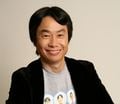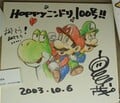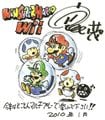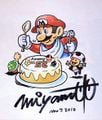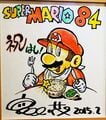Shigeru Miyamoto
| Shigeru Miyamoto | |
|---|---|
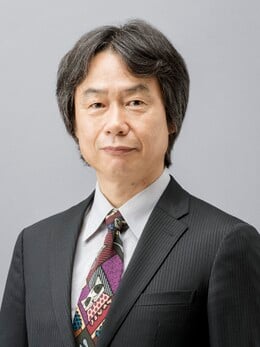 Shigeru Miyamoto in 2015 | |
| Born | November 16, 1952 (age 72)[?] |
| Super Mario–related role(s) | Representative director, game developer, artist, game designer |
- “What if, on a crowded street, you look up and see something appear that should not, given what we know, be there. You either shake your head and dismiss it, or you accept that there is much more to the world than we think. Perhaps it really is a doorway to another place. If you choose to go inside you may find many unexpected things...”
- —Shigeru Miyamoto
Shigeru Miyamoto (in Japanese: 宮本 茂) is a Japanese video game designer, producer, artist, and game director at Nintendo,[1] best known for being the creator of the Super Mario, Donkey Kong, The Legend of Zelda, Star Fox, and Pikmin franchises, among others. He joined the industry as a character artist and product designer in 1977.
Biography
In his early childhood, he was raised in the small, rural town of Sonobe, Japan, which is near his current home of Kyoto, about ten blocks from Nintendo's headquarters. His home lacked a television, so he would spend a large amount of his time exploring the surrounding countryside.
Miyamoto wanted to make things that would astonish the world. In elementary school, he considered becoming a puppeteer or a painter, and later found interest in making toys. He also learned how to play the guitar and banjo. Miyamoto decided to study industrial design at Kanazawa College of Art in 1970. Miyamoto only attended his classes half of the time, and it took him five years to graduate.
Miyamoto was 24 when his father contacted an old friend, named Hiroshi Yamauchi, at the toy company Nintendo. Yamauchi requested to see some toy designs, to which Miyamoto responded by returning with a bag of goodies and an amazing portfolio. Miyamoto became Nintendo's first staff artist in 1977, with his first work being the casings for the Color TV-Game line of plug-and-play consoles.
Three years later, in 1980, Nintendo of America was looking for a successful video game to establish themselves in the arcade market. They ordered a large number of units of the arcade game Radar Scope, but by the time the machines arrived, interest in the game had waned. Following this failure, Nintendo sought a game that the unused machines could be converted into easily. Yamauchi called Miyamoto into his office, as he was the only staff member available at the time, and questioned him about his knowledge on the video game concept, to which Miyamoto claimed to have loved video games in college. He went on to create the highly successful game Donkey Kong.
With Donkey Kong's success and the series it began, Miyamoto was given his own team: the Creative Department, later known as Nintendo EAD. They would go on to make some of Nintendo's most successful games, including Super Mario games. While Miyamoto has mentioned that he finds it difficult to say who his favorite Nintendo character is, he has stated that some of his more beloved favorites include Mario, Princess Peach, Luigi, Bowser, Princess Zelda, Toad, Link, and Donkey Kong.[2] His favorite Super Mario game is Super Mario Bros. 2 for the NES.[3][4] His favorite games for the NES are Baseball, Golf, and Mario Bros.[5] Miyamoto's favorite non-Nintendo game is Angry Birds.[6]
Miyamoto starred in a Mega 64 sketch about New Super Mario Bros.[7] Despite being an influential figure in video games and responsible for multi-million dollar franchises, Miyamoto is said to be very humble, insisting on settling for an average income. Miyamoto is also ambidextrous, though he favors his left hand and likes to make characters that are left-handed (Bowser Jr. and Link being two examples). He rides his bike or walks to work each day, usually with his wife, who he met on the job (she was a general manager for his current occupation).
In early December of 2011, it was rumored that Miyamoto had announced his retirement. A few days later, this rumor was confirmed to be false.[8]
To honor the Year of Luigi, Miyamoto was often seen wearing Luigi-styled clothing for press appearances.
Following the in-office passing of Nintendo president Satoru Iwata, Miyamoto worked alongside Genyo Takeda as Representative Director of Nintendo,[1] both leading the company until Tatsumi Kimishima's appointment as Iwata's successor.
Games credited
- Donkey Kong - Director
- Donkey Kong Jr. - Director
- Mario Bros. - Director
- Donkey Kong 3 - Director
- Super Mario Bros. - Director, Producer, Designer
- Super Mario Bros.: The Lost Levels - Director, Producer, Designer
- Yume Kōjō: Doki Doki Panic / Super Mario Bros. 2 - Producer
- Super Mario Bros. 3 - Director, Producer, Designer
- Super Mario World - Producer
- Super Mario Kart - Producer
- Donkey Kong (Game Boy) - Producer
- Donkey Kong Country - Original Donkey Kong Creator, Special Thanks
- Super Mario World 2: Yoshi's Island - Producer
- Super Mario 64 - Director, Producer
- Mario Kart 64 - Producer
- Yoshi's Story - Supervisor
- Super Smash Bros. - Producer (Production and Direction advisor)
- Mario Artist: Paint Studio - Supervisor
- Paper Mario - Producer
- Luigi's Mansion - Producer
- Mario Kart: Super Circuit - Producer
- Super Mario Sunshine - Producer
- Donkey Kong Country (Game Boy Advance) - Producer
- Mario Kart: Double Dash!! - Producer
- Donkey Konga - Supervisor
- Super Mario 64 DS - Producer, Supervising Director
- Donkey Kong Jungle Beat - General Producer
- New Super Mario Bros. - Supervisor
- Mario Kart DS - General Producer
- Super Mario Galaxy - Game Design Concept, Producer
- Mario Kart Wii - General Producer
- New Super Mario Bros. Wii - General Producer
- Super Mario Galaxy 2 - General Producer
- Mario Kart 7 - General Producer
- New Super Mario Bros. 2 - General Producer
- New Super Mario Bros. U - General Producer
- Super Mario 3D Land - General Producer
- Luigi's Mansion: Dark Moon - Producer
- Mario Kart 8 - General Producer
- Super Mario 3D World - General Producer
- Mario vs. Donkey Kong: Tipping Stars - Supervisor
- Super Mario Maker - General Producer
- Super Mario Run - Director[9]
- Mario + Rabbids Kingdom Battle - Supervisor
- Mario & Luigi: Superstar Saga + Bowser's Minions - Supervisor
- Super Mario Odyssey - Executive Producer
- Mario & Luigi: Bowser's Inside Story + Bowser Jr.'s Journey - Supervisor
- Super Mario Bros. Wonder - Supervisor
- Princess Peach: Showtime! - Senior Supervisor
Films credited
- Super Mario Bros.: Peach-hime Kyūshutsu Dai Sakusen! - Characters (credited on the back of the VHS cover)
- Super Mario Bros. - Based on the concept and characters created by
- The Super Mario Bros. Movie - Producer
Awards and honors
- The first ever Inductee to the Academy of Interactive Arts and Sciences Hall of Fame
- A star on the Walk of Game
- French Order of Arts and Literature
- Featured in Time Asia's "60 Years of Asian Heroes"
- GDC's Lifetime Achievement Award
- Subject of an episode of Icons
- The Spanish prize Príncipe de Asturias in Communication and Humanities[10]
- The 'Fellowship' award in the British Academy Video Game Awards[11]
Gallery
Sprites
Promotional photos
Miyamoto holding Mario and Donkey Kong plushies
Miyamoto holding a Mario figurine and wearing a Super Mario World t-shirt
Miyamoto with Donkey Kong and Mario amiibo
Miyamoto holding a Wii Remote in E3 2006
Shigeru Miyamoto showing the New Super Mario Bros. Wii cover
Miyamoto next to a full-scale replica of the Standard Kart from Mario Kart 7
Miyamoto with several Luigi plushies for the Year of Luigi
Miyamoto wielding a replica of Kylo Ren's lightsaber
Miyamoto from the review video of Tencent's conference for Nintendo Switch's release in China
Group photo to celebrate the grand opening of Super Nintendo World (Universal Studios Japan)
Miyamoto alongside Shinya Takahashi, Mario, and Luigi at the grand opening of Super Nintendo World (Universal Studios Hollywood)
Miyamoto at The Super Mario Bros. Movie premiere in Los Angeles.
Hand-drawn artwork
Artwork used on the Japanese Super Mario Bros. box art, illustrated by Miyamoto
Cover of Nintendo Official Guidebook - Super Mario World, illustrated by Miyamoto
Artwork celebrating the first anniversary of The 64 DREAM
Mario and a Nintendo GameCube controller
Artwork commemorating the 15th anniversary of Nintendo Power
Artwork celebrating the release of Nintendo DREAM volume 100
A letter addressed to Super Mario Galaxy players released by Prima Games
Artwork for Cat Mario
Signature wall from the Nintendo booth at E3 2019, featuring a doodle of Mario by Miyamoto
Miscellaneous
Miyamoto's Mii, distributed to Nintendo 3DS owners via StreetPass at select retail stores as part of a promotional campaign for Super Mario Maker for Nintendo 3DS
Quotes
- "Who knows how Mario will look like in the future. Maybe he'll wear metallic clothes! " - 1991[12]
- "Videogames are bad for you? That's what they said about rock 'n' roll."[13]
- "A delayed game is eventually good, but a rushed game is forever bad."[14] (Possibly apocryphal[15])
- "My favorite video game character is not Mario, it's Pac-Man."[16][dead link]
- "A great idea can solve multiple problems at the same time."[17]
- "I'll put my neck out and say that PlayStation games sound good, but when you watch them in action they're not finished at all in my opinion. A game is finished when a creator decides it is."[18]
- "I don't want to make games where the player is just a puppet in the hands of the creator, playing exactly as scripted. Trying to get players to become better and better at your game is certainly one valid approach to making games, but for me, I want to present games to players that are more like pure toys: something you can use, explore, and play with freely."[19]
- “The most pivotal aspect [of Donkey Kong Country Returns's development] was having the chance to sit down with Mr. Miyamoto and get an understanding from him what he wanted to see, what he hoped to see with DK. He never at any time stood up and said, 'This is what it will have. This is your checklist. This is what I want period.' He just offered feedback and guidance and mentorship, and that's one of the things that made Mr. Miyamoto so valuable as a resource. He can be incredibly demanding at times and there have been plenty of occasions where he just flipped the table over and said 'start again', but you can tell he wanted to happen. He wanted to see DK in a new adventure. I'll never forget as we were wrapping up our conversation with him in Kyoto, he said in English, 'Please take care of DK. He is my friend.'"”
- —Bryan Walker[20]
References
- ^ Jump up to: a b Notification of Death and Personnel Change of a Representative Director(President) (July 13, 2015). Nintendo.jp. Retrieved July 13, 2-15.
- ^ Nintendo mastermind Shigeru Miyamoto isn't ready for 'game over' [1]
- ^ Q&A: "Mario" creator Shigeru Miyamoto.
- ^ This Is Shigeru Miyamoto's Favorite Mario Game (June 15, 2012). IGN. Retrived September 1, 2014.
- ^ http://www.reinodocogumelo.com/2013/03/mario-bros-e-um-dos-games-favoritos-de.html
- ^ Shigeru Miyamoto admits he's a fan of Angry Birds
- ^ Mega64: New Super Mario Bros. Video
- ^ Nintendo: Miyamoto Not Stepping Down
- ^ Mario Is Moving Away From Mobile Games, Reveals Nintendo’s Shigeru Miyamoto (EXCLUSIVE) Variety. Retrieved April 18, 2023.
- ^ [2]
- ^ [3]
- ^ Interview in Mario Mania guide, p. 31
- ^ Shelf, David (1993). Game Over: How Nintendo Conquered The World. Random House.
- ^ Shigeru Miyamoto: A rushed game is forever bad (April 27, 2012). The Guardian. Retrieved September 2, 2014.
- ^ Famous Miyamoto Quote About Delayed Games Could Be Misattributed - Game Rant. Retrieved October 14, 2023.
- ^ David Doñas Salinas Metroide, Por. (2002) Biografía Shigeru Miyamoto (Spanish), translated. Retrieved August 22, 2008.
- ^ http://www.nintendo.com/nintendo_direct
- ^ Miyamoto Says PlayStation Games Felt Incomplete (March 15, 2014). Gamnesia. Retrived September 2, 2014.
- ^ terebi game denshi yuugi taizen [1989], english translation by Blackoak, shmuplations, http://shmuplations.com/miyamoto1989/. Retrieved February 27, 2017
- ^ Kiwi Talkz (October 2, 2021). "Bryan Walker Interview (Metroid Prime Trilogy, Donkey Kong, Mario Kart 7, Project Management)". YouTube. Retrieved October 2, 2021.






